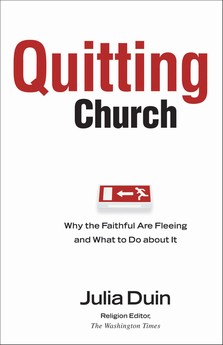
Why do people stop going to church? This big question is the subject of Julia Duin’s small book, Quitting Church: Why teh Faithful are Fleeing and What To Do About It. Duin is not a disinterested observer of the phenomenon of church-dropping; rather, she’s a churchgoer who wants churches to work well, and also a skilled reporter who knows how to apply the tools of her trade.
The result is a book that makes for uncomfortable reading for anyone invested in good church ministry; Duin is straightforward in her examination of the myriad ways churches can fail Christian believers. But she’s not without hope in American churches and their ability to find a way forward.
Duin took on some questions via email. Our exchange appears after the jump.
A lot of people look to the large and growing ministries of Joel Osteen, Rob Bell, Mark Driscoll, et al, and would be surprised to hear that churches are shrinking. Give us the lay of the land–what is happening with church attendance in America?
No one agrees on how many folks are in church, but we do know several denominations are losing people like crazy. The Episcopalians are losing 1,000 people a week. The Southern Baptists, believe it or not, are also showing drops in baptisms and membership. Were it not for Hispanics, which are by now one-third of US Catholicism, the Catholic Church would be in enormous trouble as the numbers of confirmations, marriages in the church, confessions, etc., have dropped horribly. The Mormons and the Assemblies of God show up atop most surveys as groups that are growing. The Osteens, Bells, Driscolls of this world are adding on members, but they can only do so much. The overall effect is shrinkage.
And even if people haven’t cut off their membership, they aren’t attending like they used to at all. People just aren’t in church for mid-week services like they used to be–go driving any Sunday morning and tell me if you think 2/5 of the America population (Gallup’s 41-44%) are going to church at that point. It’s obvious they’re not.
How have megachurches reshaped our thinking about church life?
People want their needs met. I don’t think that’s a bad thing, but I was really attacked on a recent radio show for suggesting churches should be more willing to cater to some pretty obvious needs. Like, I was asked what singles – an underserved group if there ever was one in church life – need, and I said, “To get married.” Pastors in other countries, e.g. India, see matchmaking as part of their job description but here in the States, it’s every believer for him or herself. And there are record amounts of single Christians out there today, few of whom wish to be that way. I really got attacked for suggesting peoples’ needs should be met, as the typical churchgoer is supposed to be in this to be a servant, not to get their needs met. At least that’s what’s preached. That is nonsense, of course; parents walk in all the time expecting to have their children given Christian teaching in Sunday school, so that “need” is considered legit. People do need friends, they need fellowship, they need to hear from God. What is so bad about churches tending to those things?
The megachurches have set themselves to identifying felt needs and providing the staff and programming to meet those needs. They’ve brought marketing into the equation. I am not a megachurch attendee, as I like to know my pastor and have my pastor know me, but I can see the attraction.
You say that today’s churches are set up to minister to whole families, but not so much to singles and women. What are singles and women experiencing at church today?
Women are slotted into childcare jobs and maybe ushers or the choir – or the worship team, as it’s called today. But women like me, who are seminary-educated, are given no place to teach. The offer is never extended. Ditto for other women who are lawyers, accountants, etc., who know things that could be of some benefit to the body of Christ. These women are underused at best. Or they are told they can only minister to other women.
When you’re used to be treated equally in the job market, it’s like entering a time warp when you go to church and are told that who you are is dependent on who or what your husband is. Women whose husbands are elders or ministers have more freedom to exercise ministry, but all other women aren’t given much of a chance.
What’s also galling is how so many women are treated like sexual temptresses. I get tired of pastors telling me they cannot be alone with me and can’t meet me for coffee somewhere, while it’s OK if they get together with a male parishioner. Thus, I never get to network or exchange ideas with the pastor – I (and other women) simply lose out. We have to reply on our husbands – if we have one – to advance our cause in church.
As for singles, there’s 100 million of us out there, and we are the largest unreached demographic there is. Most churches tolerate us but do not want to expend any time or money ministering to us. Any extra funds goes toward youth ministry. The singles over 35 are especially unwanted – and this is a group that earns substantial income, but also has some real needs. Yet, they never hear sermons pertaining to their station in life while getting hit 24/7 with all sorts of spiritual attacks, ranging from depression or loneliness to unmet sexual desires.
Many churches focus on threats to the family, but they never consider the battles so many are facing to even form a family. A lot of singles are waking up and walking out of churches that only minister to couples with chldren (the church I left was one of those), but many others are still lingering at their churches, praying that some godly mate will show up. Walk into your typical evangelical church and you will find next to no single men who are, say, over 30. They don’t exist. They’re either married or not in church. It’s a mess out there, but your typical parish priest or minister is totally clueless to the hellish choice most Christian single women face: Either marry someone who is not a believer at all, or stay single. Or even if the clergy are not clueless about this situation, they don’t care to help resolve it.
For as long as I can remember, evangelical churches have been stressing the need to be “relevant” to American culture. You say they’ve failed on this front–that they are out of touch. How has this happened, and what can be done about it?
Relevancy means speaking to the true battles people are facing in terms of depression, exhaustion, joblessness, inability to connect with God, etc. I do not see most pastors at all in touch with how the majority of their listeners have no idea how to hear from God. This should be a top priority.
Relevancy is understanding what your typical parishioner goes through; everything from killer rush hours to family breakdowns. One wonders if pastors lead real lives. I think many are isolated from what the rest of us face; thus, I rarely if ever take notes in church any more, because there’s rarely anything insightful in the typical sermon.
Part of the problem is that pastors do not want to admit that much of Christianity does not work. So many of the promises in Scripture simply don’t come true, and people cannot wrap their minds around that contradiction. Now, there are ways around this, but it’s the rare pastor who gets it that people are struggling with what their lives are like and what the Bible stays – and the wide gulf in between. Speaking to those hard spots would be so helpful.
Unanswered prayer is so huge an issue yet very few authors – Philip Yancey, Bob Sorge – address this. After a while people think they must be awful Christians because the system is not working for them, so they drop out out of sheer discouragement. That does not need to happen, yet this goes on all the time. Folks hate being part of something in which all they do is fail.
You do not seem like a typical church critic. Other writers, whether Christian or not, have approached this topic with apparent glee, because they seen evidence of their own indictment of Christianity. Your account is more sob
ered. What made you want to tell this story?
ered. What made you want to tell this story?
I was part of the Jesus movement and the charismatic renewal, so I have seen how wonderful Christianity was back in the halycon days of revival in the 1970s. I know things can be better. I have experienced Jesus myself; I have learned to hear His voice, and it is nonsense to say He has failed.
I don’t know why God’s power was so evident 30 years ago but now, things are a shadow of what they were. The church is the hope of the world. There is no other way God has left open to work in the world.
Over the years, it’s fallen to me to warn and warn and warn church folks about various things, and that seems to be my task in life. I have another book coming out this fall on the rise and the fall of the charismatic renewal and intentional communities, and how a perfectly good movement that had tons of potential in evangelizing the world got sullied by sin. The book is a warning to folks – especially as Christian community is coming back ‘in’ with the Gen Y folks – of what went wrong with folks who are their parents’ age.
So, I am not gleeful that so much has failed. Like David Wilkerson (of The Cross and the Switchblade) told me, ‘We’re losing ground that was already won.” He’s right. I am trying to warn the people out there that still care about the church that while not all is lost, major course corrections need to be made.

